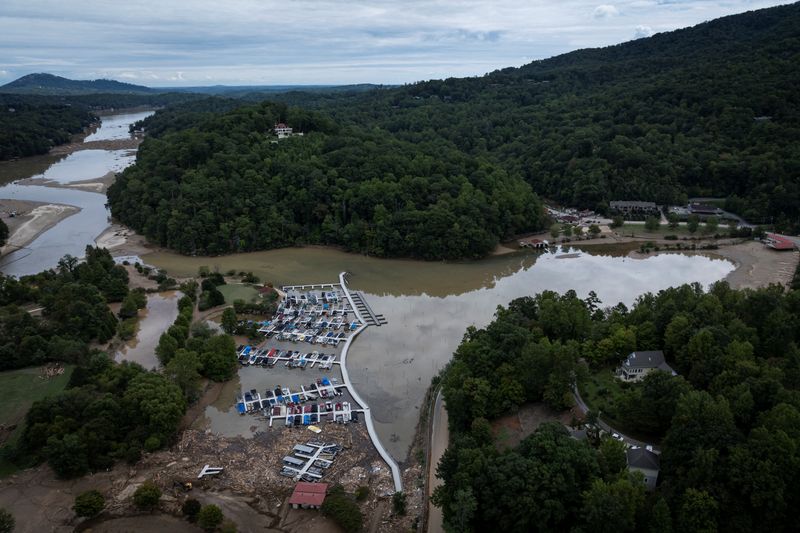Rescuers scour North Carolina mountains for survivors cut off by Hurricane Helene
2024.10.01 15:49
By Andrew Hay and Rich McKay
(Reuters) -Rescue workers searched for survivors in the mountains of western North Carolina on Tuesday, trying to contact and deliver aid to hundreds of people cut off by washed-out roads, felled power lines and damaged cellphone towers following Hurricane Helene.
The storm killed more than 100 people across North Carolina, South Carolina, Georgia, Florida, Tennessee and Virginia, and the death toll is expected to rise once rescue teams reach isolated towns and telecommunications are restored.
Among the dozens who died in the mountainous counties around Asheville, North Carolina, was David Carver, 58, who had attempted to divert water away from his home in Linville Falls, according to a friend who tried to save him.
As Carver worked with a shovel in driving rain on Friday, half his house gave way in a mudslide, taking him down the hillside with it.
His life-long friend and neighbor Ken Fisher, 60, rushed to help after Carver was swept into a drainage pipe where he was trapped by trees and other debris.
Fisher poured water over Carver’s face to wash off mud so he could open his eyes, told him his wife was safe and prayed with him.
“I told him I wasn’t going to let him die there, I said ‘I’m going to get you out of there,” Fisher recalled. He stayed with Carver for 11 hours until emergency personnel were able to get him out of the pipe. Carver died in hospital at around 4 a.m. on Saturday from trauma to internal organs.
North Carolina was coordinating 92 search and rescue teams from 20 states and the U.S. government, according to Governor Roy Cooper. Most efforts were in the Appalachian Mountains that run through the western part of the state where the storm ripped up roads, leveled trees and tossed homes about.
Covered in mud, Jannette Montenegro shoveled two feet (60 cm) of river sediment and debris out of Cotton Mill Studios, a building filled with shops and art studios she owns in Asheville, a popular tourist destination.
Her son’s Cuban food truck, Guajiro, which was parked out front, was toppled in the water and washed away, she said.
“My son’s livelihood is gone,” said Montenegro, 52. “Everything here is gone, washed away.”
On Monday emergency workers delivered 600,000 meals and a million liters (quarts) of water to a region where at least one water treatment plant has been damaged by the storm.
Hundreds of roads were closed, and thousands of people have registered for U.S. Federal Emergency Management Agency assistance, officials said on Monday.
Helene was a powerful Category 4 hurricane when it slammed into the Florida Gulf coast on Thursday, tearing a destructive path through southeastern states for several days.
More than 1.7 million homes and businesses in six states from Florida to West Virginia remained without power on Tuesday morning, according to the website Poweroutage.us, including about 625,000 in South Carolina and 468,000 in Georgia.
Georgia Governor Brian Kemp said at least 25 people in his state had died. South Carolina reported at least 29 dead.
CNN reported that at least 140 people had been killed in six states, citing state and local officials.
Hundreds of people have been reported missing, a number that is expected to decline as more telecommunications come back on line and emergency workers are able to get into remote areas.
In North Carolina’s mountainous Buncombe County, which includes the tourist destination of Asheville, 40 people have died, county officials said.

John Templeton, 46, evacuated with his family from Fairview, North Carolina, on Saturday, a familiar exercise for him after having evacuated from Houston during Hurricane Harvey in 2017 and performing relief work in Gulfport, Mississippi, after Hurricane Katrina in 2005. “I’m pretty familiar with disaster zones and this is worse than any I’ve seen before,” he said, speaking from the town of Chapel Hill, about 200 miles (320 km) east of Asheville. As Templeton left on the only accessible road out of Asheville he passed a convoy of National Guard vehicles and water trucks coming the other way. “It was a sinking feeling in my stomach because I knew that everybody still there just had no idea what the coming suffering and misery would look like,” he said.
U.S. President Joe Biden said he would visit North Carolina on Wednesday and Georgia and Florida soon after. He may also ask the U.S. Congress to return to Washington for a special session to pass supplemental aid funding.








